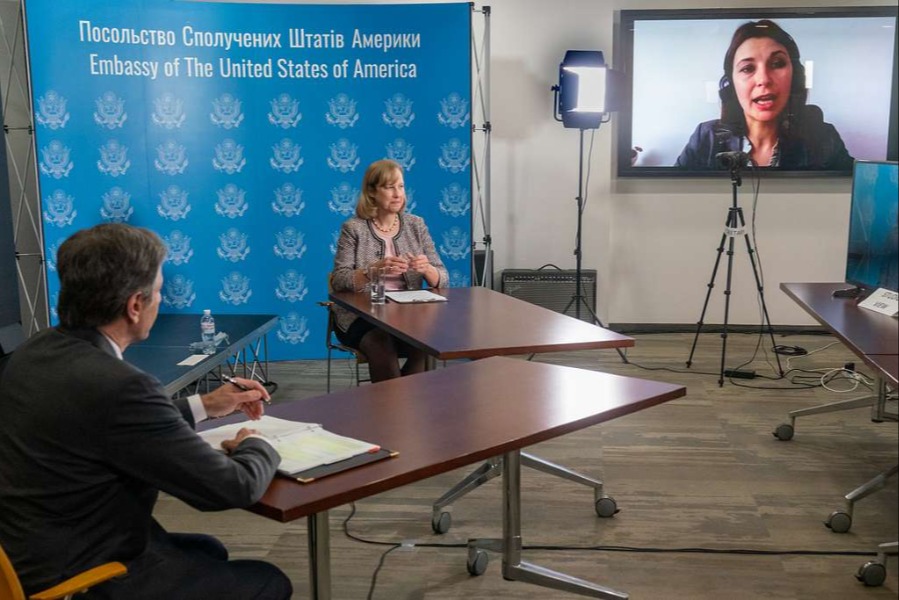Today's Headlines and Commentary
The bombing of Aleppo began once again on Wednesday morning despite a ceasefire deal that would have allowed the evacuation of civilians and rebel fighters to rebel-held territory, stranding both civilians and troops within the besieged city, The New York Times reports.
Published by The Lawfare Institute
in Cooperation With

The bombing of Aleppo began once again on Wednesday morning despite a ceasefire deal that would have allowed the evacuation of civilians and rebel fighters to rebel-held territory, stranding both civilians and troops within the besieged city, The New York Times reports. The evacuation plans collapsed when Iran, which was not consulted during ceasefire negotiations brokered by Turkey, demanded that rebel forces allow wounded pro-government fighters and their relatives to be evacuated from two Shiite villages besieged by rebels in Idlib province, Reuters writes. The Kremlin has blamed a resumption in rebel hostilities for the failed evacuation. The Wall Street Journal suggests that the deal’s breakdown is a reminder of the dysfunction and disagreement between the many different forces that have aligned with the Assad regime over the course of the war in Syria.
The Syrian Observatory for Human Rights reports that a gas attack may have been conducted near the city of Palmyra, which was recently recaptured by ISIS. Numerous people appear to have been suffocated or wounded with breathing problems after the attack took place during a period of heavy airstrikes. The Islamic State’s news agency has blamed Russia, claiming that sarin gas was used. Reuters has more.
Syrian President Bashar al-Assad suggested that President-elect Donald Trump could be the regime’s “natural ally” by “fight[ing] against terrorism,” Reuters tells us. Assad cited Trump’s campaign-trail statements calling for a focus on attacking militant Islamists.
Trump’s appointee for national security advisor, General Michael Flynn, “inappropriately shared” classified information with British and Australian military officers in Afghanistan, the Post reports. While the investigation of Flynn’s misconduct remains classified, it appears that Flynn gave allies information about CIA operations in Afghanistan, as well as operations of other agencies, without permission from his superiors. During the campaign, Flynn was a fierce critic of Hillary Clinton’s use of a private email server. Notably, the investigation into his dissemination of classified information was ordered by the head of U.S. Central Command—who, at the time, was General James Mattis, now Trump’s appointment for Secretary of Defense.
The Times provides an exhaustive review of how Russia’s hacking of Democratic Party information unfolded during the presidential campaign. In the end, the hacking and leaking scheme succeeded, the paper writes: it not only elected Donald Trump but also weakened American democracy and the institutional legitimacy of elected U.S. leaders. And the cyberattacks didn’t stop at the national level, but also targeted Democratic candidates for the House of Representatives by distributing documents hacked from the Democratic Congressional Campaign Committee.
The Senate Foreign Relations Committee will hold hearings on Russian efforts to interfere with the election, committee chair Senator Bob Corker (R-TN) announced yesterday. The Senate Intelligence Committee and Armed Services Committee have also indicated that they will conduct investigations into the hacking and leaking effort, The Hill writes.
Republican legislators who previously took a hard line against Russia are now facing a dilemma in the form of Exxon Mobil CEO Rex Tillerson, Trump’s nominee for Secretary of State, the Times tells us. Tillerson’s ties business ties to the Kremlin have been the subject of close scrutiny since his name was floated for the position over the weekend, drawing criticism from Republicans as well as Democrats. The party is now grappling with a historic disjuncture between its historically hawkish approach to Russia and the new and apparently Kremlin-friendly administration.
In the Daily Beast, nuclear nonproliferation expert Jeffrey Lewis argues that Trump’s decision to appoint former Texas Governor Rick Perry as Secretary of Energy is a concerning departure from the recent tradition of filling the post with a candidate who boasts “real technical expertise.” Technical knowledge of nuclear weapons and proliferation has turned out to be crucial in nuclear negotiations—and Perry, despite his government experience, has none of this.
The Islamic State has claimed responsibility for a bombing attack on a Coptic church in Cairo that killed 25 people on Sunday and marked the deadliest assault on Egypt’s Coptic Christian community since 2011. The Times reports ISIS’s promise to heighten its “war on polytheism,” meaning Christianity. The bombing poses a political and security challenge for Egyptian President Abdel Fattah el-Sisi, whose government previously blamed its political enemy, the Muslim Brotherhood, for the attack.
A U.S. airstrike killed three ISIS leaders involved in planning multiple terrorist attacks in Europe, most notably the November 2015 Paris attack, the Pentagon has announced. The three men, whom the Pentagon described as “directly involved in facilitating external terror operations and recruiting foreign fighters,” were killed in the Islamic State’s de facto capital of Raqqa.
A rival of Afghanistan’s Vice President Abdul Rashid Dostum has accused Dostum’s forces of abducting, torturing, and raping him last month during President Ashraf Ghani’s absence from the country, the Times writes. The Afghan government has announced that it will investigate the allegations, though Dostum’s office dismissed them as a conspiracy to defame him. Dostum has long been a controversial figure in Afghanistan for his history as a warlord, though Ghani selected him as a running mate in an effort to appeal to the country’s ethnic Uzbek population.
Admiral Harry Harris, commander of U.S. Pacific Command, reassured U.S. allies that “you can count on America now and into the future” at a speech in Sydney, the Financial Times tells us. Harris argued that the election of Donald Trump will not shake the United States’ commitment to the Pacific region, where the U.S. will continue to confront China’s “aggressive behavior.” Reuters notes that Harris’s comments may further raise tensions between China and the U.S., which have been high following a series of unorthodox comments by Trump on Chinese currency and foreign policy.
China will oppose new unilateral Japanese and South Korean sanctions against North Korea, a Chinese diplomat has indicated. Beijing aims to maintain its support for joint U.N. sanctions on Pyongyang but will not back unilateral sanctions outside that framework.
Philippine President Rodrigo Duterte appears to have confessed to personally murdering criminal suspects while mayor of the city of Davao, the BBC writes. Duterte has been widely condemned for his encouragement of extrajudicial police killings as part of his ongoing antidrug crackdown.
Guantanamo’s Periodic Review Board has cleared another prisoner for transfer, bringing the total of prisoners cleared for release up to 22, Carol Rosenberg reports at the Miami Herald. Yassin Qasim Muhammad Ismail Qasim, a Yemeni detainee, had previously been classified as a “forever prisoner” who would neither be charged nor released.
The Herald also updates us on ongoing pretrial hearings in the USS Cole case at Guantanamo this week. Defense attorneys for Abd al Rahim al Nashiri are seeking government information about a targeted assassination to determine the role of the executed man in orchestrating a second attack also attributed to Nashiri, the bombing of the Limburg oil tanker.
ICYMI: Yesterday, on Lawfare
J. Dana Stuster updated the Middle East Ticker, reviewing the situation in Aleppo, the attack on a Coptic Christian church in Cairo, and what Rex Tillerson’s appointment as Secretary of State means for the region.
Michael Linhorst told us about an ACLU effort to compel release of opinions of the Foreign Intelligence Surveillance Court on First Amendment grounds.
Chris Mirasola examined Trump’s appointment of Tillerson as secretary of state.
Ken Watkin reviewed Jens David Ohlin and Larry May’s book Necessity in International Law.
Paul Rosenzweig argued that the Attorney General should call into session a special grand jury to study Russian efforts to influence the presidential election.
Timothy Edgar asserted that we should brief the members of the Electoral College on the available intelligence on Russian election interference.
Email the Roundup Team noteworthy law and security-related articles to include, and follow us on Twitter and Facebook for additional commentary on these issues. Sign up to receive Lawfare in your inbox. Visit our Events Calendar to learn about upcoming national security events, and check out relevant job openings on our Job Board.





